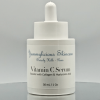How Nutrition Impacts Your Skin
Because skincare doesn’t start at the surface
Radiant skin isn’t just made in the mirror — it’s built in the kitchen.
Fresh fruits, vegetables, healthy fats, and antioxidant-rich foods do more than fuel your body — they directly influence how your skin looks, feels, and ages. While a great serum can transform your complexion from the outside, long-term skin health begins with what you put on your plate.
In other words: glowing skin is nourished, not just applied.
Your Skin Is a Reflection of Your Diet.
Your skin is the largest organ in your body — and it’s metabolically active. That means it responds to what you eat: absorbing nutrients that help it regenerate, fight off stress, and retain moisture.
When your diet is lacking in essential nutrients, your skin often shows the signs first: dullness, dryness, breakouts, or early wrinkles.
Let’s look at what your skin needs — and why it matters.
Nutrients That Feed Your Skin
1. Antioxidants (Vitamins A, C, E, Polyphenols)
These neutralize free radicals that break down collagen and accelerate aging. Found in: berries, citrus fruits, leafy greens, carrots, sweet potatoes, green tea1.
2. Omega-3 Fatty Acids
Essential for maintaining the skin’s lipid barrier, which prevents water loss and inflammation. Found in: fatty fish, walnuts, flaxseeds, chia seeds2.
3. Collagen-Boosting Nutrients (Vitamin C + Amino Acids + Zinc)
Support your body’s natural production of collagen, keeping skin firm and elastic. Found in: citrus, bell peppers, broccoli, pumpkin seeds, and bone broth3.
4. Water-Rich Foods
Hydration isn’t just about what you drink — eating water-rich foods helps maintain cellular hydration. Found in: cucumbers, watermelon, celery, berries, and lettuce4.
5. Skin-Healing Minerals (Zinc, Selenium, Copper)
Help with tissue repair and inflammation control. Found in: nuts, seeds, shellfish, whole grains, and eggs5.
What to Minimize
Some foods deplete the skin or contribute to premature aging:
√ Refined sugars → trigger inflammation and glycation, which damages collagen
√ Trans fats and excess omega-6s → increase skin sensitivity and inflammation
√ Alcohol → dehydrates and strips the skin of nutrients
√ Processed, nutrient-poor foods → leave your skin undernourished and dull
Feed Your Skin Daily: A Sample Glow Menu
Here’s a quick, skin-friendly day of eating:
🌞 Breakfast: Greek yogurt with berries, chia seeds, and a drizzle of honey
🥗 Lunch: Salmon salad with avocado, mixed greens, and pumpkin seeds
🍵 Snack: Green tea and cucumber slices with hummus
🌙 Dinner: Stir-fried veggies, quinoa, and tofu or grilled fish
🍫 Dessert: A square of dark chocolate (yes, really — it’s rich in polyphenols!)
| “Your skin is like a garden — nourish it from within, and it blooms naturally.”
How Yummylicious Skincare Complements What You Eat
Even with the best diet, your skin still needs topical support — especially for hydration, protection, and regeneration. That’s why our formulations are packed with vitamin-rich, bioavailable ingredients that mirror the nutrients your skin loves.
Try these skin-food-inspired favorites:
√ Vitamin C Serum — with Vitamin C, Aloe, Rosehip, and Hyaluronic Acid to hydrate and brighten
√ Stem Cell Serum — with peptides, plant-based antioxidants, and botanical enzymes for deep rejuvenation
√ Day Cream with SPF 50 — rich in Shea Butter, Collagen, and protective antioxidants
√ Scrub or Cleanser — featuring ingredients like papaya, chamomile, and vanilla for gentle exfoliation
Each product is designed to work in harmony with your body’s natural rhythms — and the nutrients you feed it from the inside.
Skin Food Is Real Food
There’s no one perfect ingredient, meal, or cream. But together — good nutrition, thoughtful skincare, and a bit of consistency — they create a foundation for lasting radiance.
References
1. Pullar, J. M., Carr, A. C., & Vissers, M. C. M. (2017). The roles of vitamin C in skin health. Nutrients, 9(8), 866.
2. Calder, P. C. (2012). Omega-3 fatty acids and inflammatory processes: from molecules to man. Biochemical Society Transactions, 40(1), 110–117.
3. Proksch, E., Schunck, M., Zague, V., Segger, D., Degwert, J., & Oesser, S. (2014). Oral intake of specific bioactive collagen peptides reduces skin wrinkles and increases dermal matrix synthesis. Skin Pharmacology and Physiology, 27(3), 113–119.
4. Genuis, S. J., & Schwalfenberg, G. K. (2021). Water: An essential but overlooked nutrient. Journal of Environmental and Public Health, 2021.
5. Dreno, B., et al. (2016). Nutritional factors in the pathogenesis and treatment of acne: A systematic review. Journal of the European Academy of Dermatology and Venereology, 30(6), 963–974.
Because your skin deserves the best!








